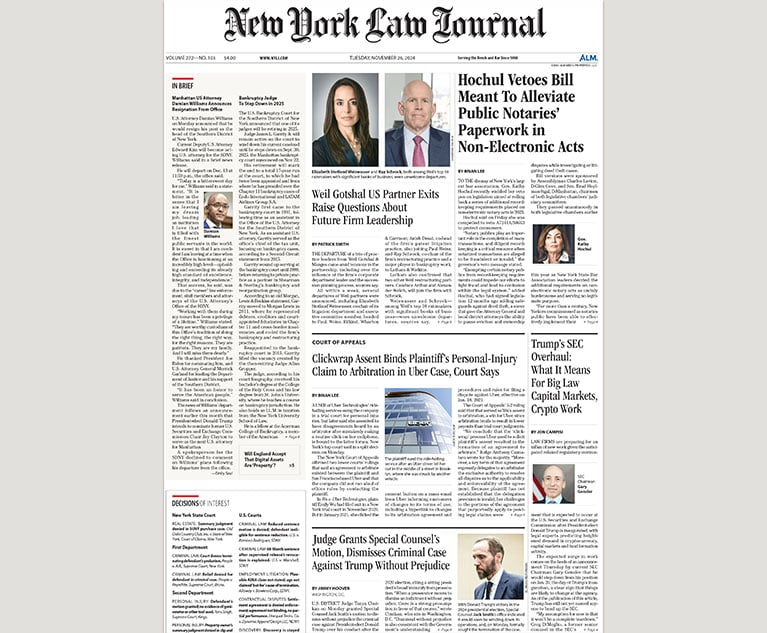 Kirkland & Ellis partners Lauren Casazza, left, and Kim Nemirow, right. (Courtesy photos)
Kirkland & Ellis partners Lauren Casazza, left, and Kim Nemirow, right. (Courtesy photos)Kirkland's #MeToo Practice Pitch Targets Private Equity, Corporate Risk
Lauren Casazza, a New York litigation partner who co-founded Kirkland & Ellis' #MeToo practice, said it started when the movement developed. "Each of these new headlines was coming in and the companies knew they had to react to it."
September 27, 2019 at 09:12 AM
3 minute read
The original version of this story was published on The American Lawyer
National and international law firms are continuing to tout practices tied to the rise in sexual harassment liabilities in the #MeToo era—from investigating and defending against employment claims to a recent big-firm twist on a plaintiffs-side discrimination practice.
But Kirkland & Ellis is among the few firms to explicitly tag a practice with the viral hashtag—and the firm says its "Workplace Compliance & Investigations-#MeToo" group is also unique in the expertise it can offer a core clientele of the firm: private equity firms.
The media headlines around the #MeToo movement acted as a driver for the practice, co-founders Lauren Casazza and Kim Nemirow, said.
"It all really started when the movement started," Casazza, a litigation partner in Kirkland's New York office, said. "Each of these new headlines was coming in and the companies knew they had to react to it."
That was about two years ago, as the accusations against Harvey Weinstein and others were mounting. Casazza, and Nemirow, a partner in the government and internal investigations group in Kirkland's Chicago office, decided to start being proactive about their approach to assisting companies—and especially private equity sponsors—manage and respond to #MeToo related risks such as harassment claims, whistleblower clauses and workplace policies.
"I think what had traditionally been handled by management, such as sexual harassment claims, is now being elevated to the board level," Newirow said. "And this poses an enterprise risk."
The move makes sense, as Kirkland is uniquely positioned in the private equity space. The firm has depended heavily on work for the industry over the past decade to facilitate revenue growth from around $1.4 billion in 2009 to over $3.7 billion reported in 2018, according to ALM data.
The private equity sponsors are often looking for a snapshot of their workplace compliance efforts across their companies, the firm said, so they can either proactively improve policies or reactively address a current situation swiftly and smartly.
The kinds of matters the group addresses could range from high-profile threats to less obvious risks—an outdated sexual harassment policy prior to a large IPO or a damaging Instagram post by a wronged former employee—but they all represent what Casazza and Nemirow called "enterprise class" threats to a company's financial and reputational future. And steering clear or addressing such potential pitfalls is paramount to maximizing investments, the firm said.
"It's a good thing that our clients are speaking about these risks," said Casazza, "because it is driving necessary changes."
|Read More
Quinn Emanuel Courts #MeToo Victims, Shareholders With New Practice Group
This content has been archived. It is available through our partners, LexisNexis® and Bloomberg Law.
To view this content, please continue to their sites.
Not a Lexis Subscriber?
Subscribe Now
Not a Bloomberg Law Subscriber?
Subscribe Now
NOT FOR REPRINT
© 2024 ALM Global, LLC, All Rights Reserved. Request academic re-use from www.copyright.com. All other uses, submit a request to [email protected]. For more information visit Asset & Logo Licensing.
You Might Like
View All
Patent Trolls Come Under Increasing Fire in Federal Courts

Trending Stories
Who Got The Work
Michael G. Bongiorno, Andrew Scott Dulberg and Elizabeth E. Driscoll from Wilmer Cutler Pickering Hale and Dorr have stepped in to represent Symbotic Inc., an A.I.-enabled technology platform that focuses on increasing supply chain efficiency, and other defendants in a pending shareholder derivative lawsuit. The case, filed Oct. 2 in Massachusetts District Court by the Brown Law Firm on behalf of Stephen Austen, accuses certain officers and directors of misleading investors in regard to Symbotic's potential for margin growth by failing to disclose that the company was not equipped to timely deploy its systems or manage expenses through project delays. The case, assigned to U.S. District Judge Nathaniel M. Gorton, is 1:24-cv-12522, Austen v. Cohen et al.
Who Got The Work
Edmund Polubinski and Marie Killmond of Davis Polk & Wardwell have entered appearances for data platform software development company MongoDB and other defendants in a pending shareholder derivative lawsuit. The action, filed Oct. 7 in New York Southern District Court by the Brown Law Firm, accuses the company's directors and/or officers of falsely expressing confidence in the company’s restructuring of its sales incentive plan and downplaying the severity of decreases in its upfront commitments. The case is 1:24-cv-07594, Roy v. Ittycheria et al.
Who Got The Work
Amy O. Bruchs and Kurt F. Ellison of Michael Best & Friedrich have entered appearances for Epic Systems Corp. in a pending employment discrimination lawsuit. The suit was filed Sept. 7 in Wisconsin Western District Court by Levine Eisberner LLC and Siri & Glimstad on behalf of a project manager who claims that he was wrongfully terminated after applying for a religious exemption to the defendant's COVID-19 vaccine mandate. The case, assigned to U.S. Magistrate Judge Anita Marie Boor, is 3:24-cv-00630, Secker, Nathan v. Epic Systems Corporation.
Who Got The Work
David X. Sullivan, Thomas J. Finn and Gregory A. Hall from McCarter & English have entered appearances for Sunrun Installation Services in a pending civil rights lawsuit. The complaint was filed Sept. 4 in Connecticut District Court by attorney Robert M. Berke on behalf of former employee George Edward Steins, who was arrested and charged with employing an unregistered home improvement salesperson. The complaint alleges that had Sunrun informed the Connecticut Department of Consumer Protection that the plaintiff's employment had ended in 2017 and that he no longer held Sunrun's home improvement contractor license, he would not have been hit with charges, which were dismissed in May 2024. The case, assigned to U.S. District Judge Jeffrey A. Meyer, is 3:24-cv-01423, Steins v. Sunrun, Inc. et al.
Who Got The Work
Greenberg Traurig shareholder Joshua L. Raskin has entered an appearance for boohoo.com UK Ltd. in a pending patent infringement lawsuit. The suit, filed Sept. 3 in Texas Eastern District Court by Rozier Hardt McDonough on behalf of Alto Dynamics, asserts five patents related to an online shopping platform. The case, assigned to U.S. District Judge Rodney Gilstrap, is 2:24-cv-00719, Alto Dynamics, LLC v. boohoo.com UK Limited.
Featured Firms
Law Offices of Gary Martin Hays & Associates, P.C.
(470) 294-1674
Law Offices of Mark E. Salomone
(857) 444-6468
Smith & Hassler
(713) 739-1250








